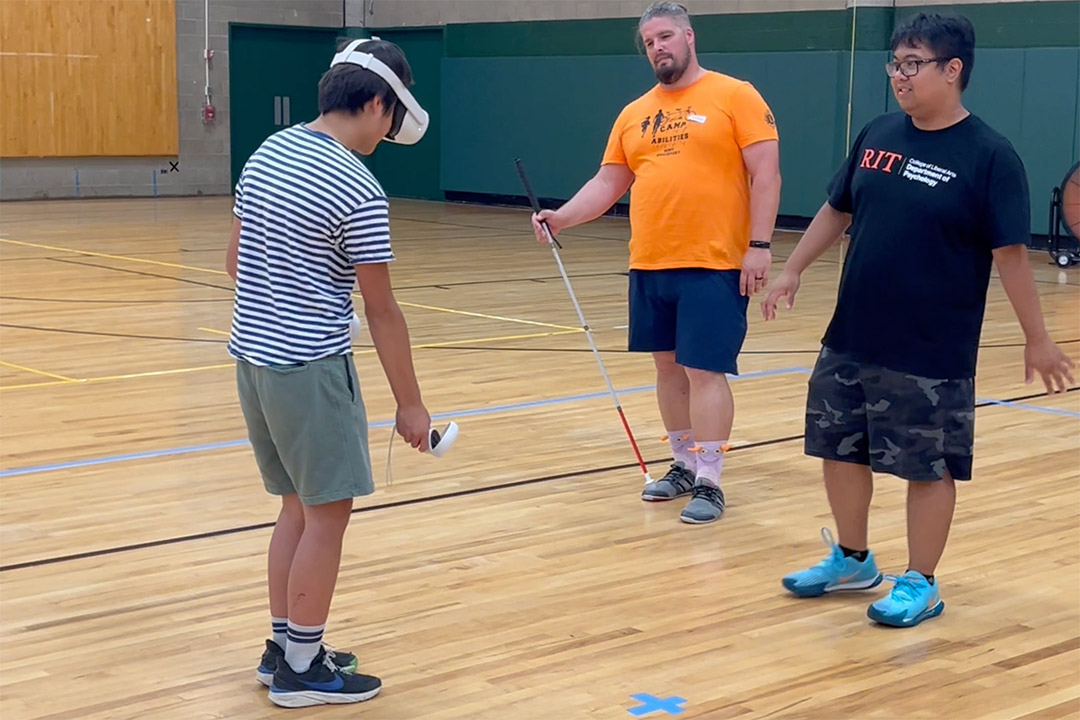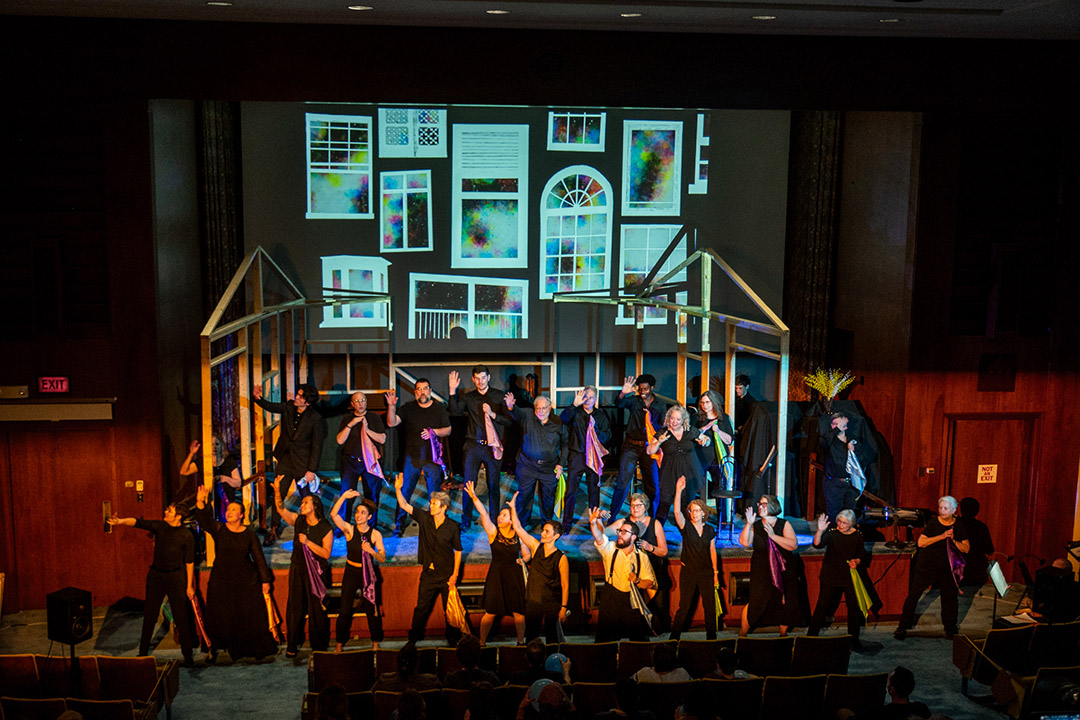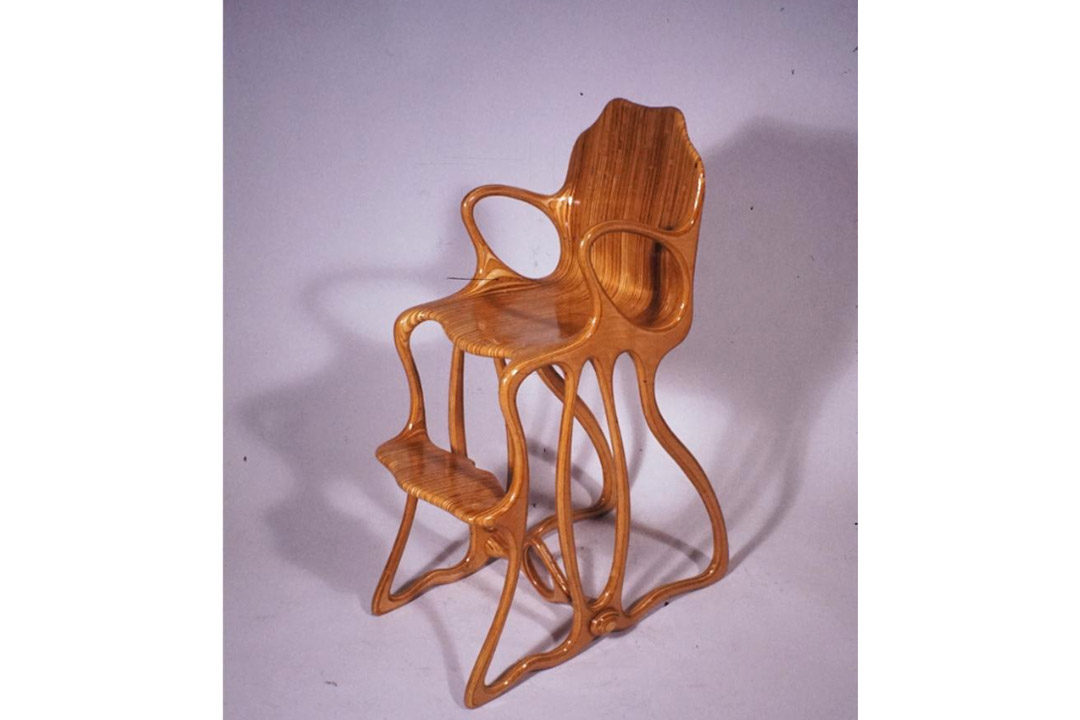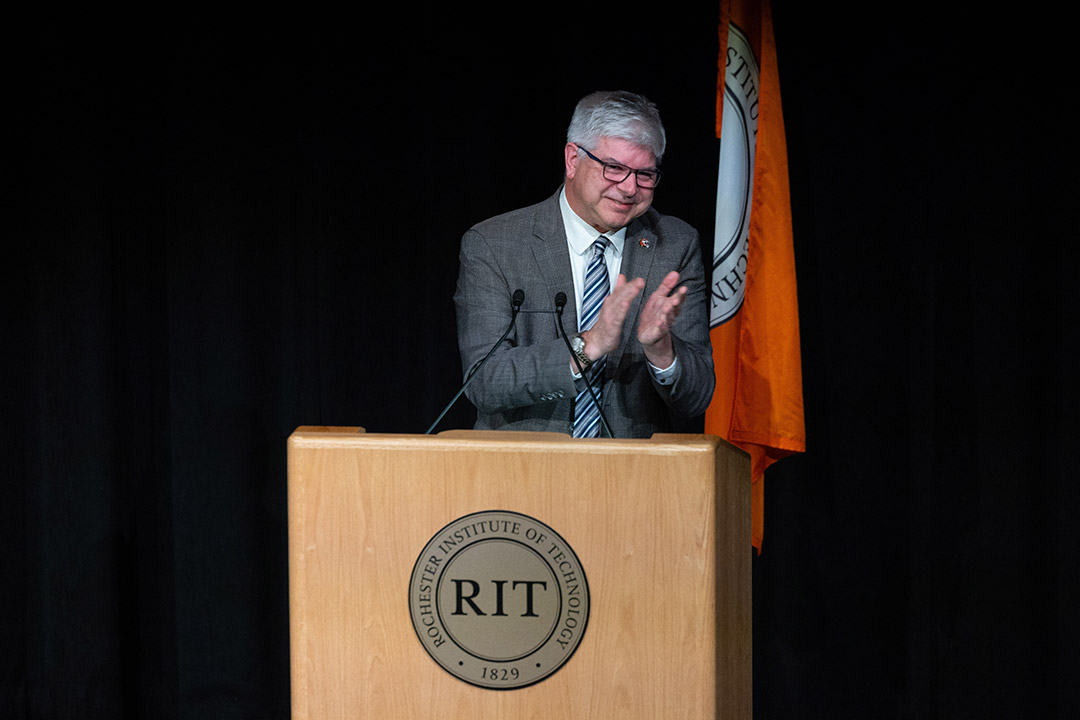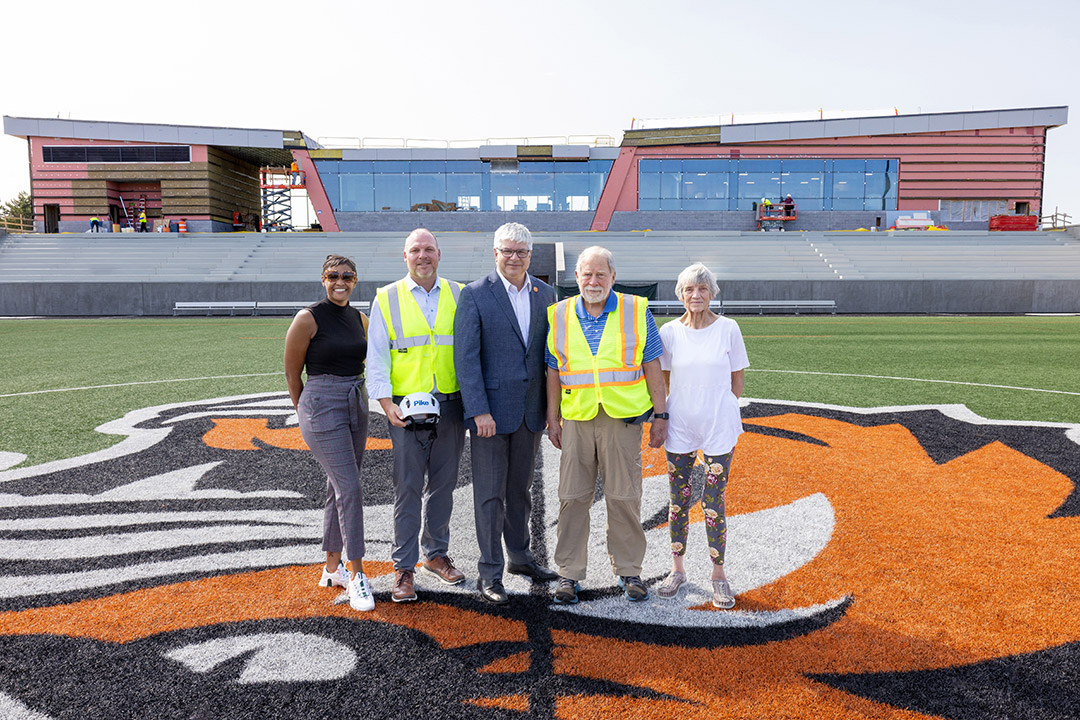Digital media projects take shape with help from MAGIC Spell grants
Faculty member Meghdad Asadilari is several steps closer to launching an animated film about his immigration story thanks to seed funding provided by RIT’s MAGIC Spell Studios.

Meghdad Asadilari
Asadilari, an assistant professor in the College of Art and Design whose expertise is in 2D and 3D animation, visual effects, and computer simulations, used the funding to acquire powerful equipment to use advanced industry-standard animation and simulation software, like Houdini and Unreal, to enhance the visual effects in the film. Features like flowing threads and the texture of his grandfather’s carpet-weave design will appear more realistic, bringing the engaging story to life for viewers.
The new MAGIC Spell grants, earmarked for digital media projects in art, games, interactivity, and creativity, provide RIT researchers in any college with funding up to $5,000 to help in their pursuits to secure additional external grants in their fields.
“The MAGIC Spell grant program provides an essential financial boost to help projects cover early development costs,” said David Long, MAGIC Spell Studios director. “Researchers know that early results and prototypes can bring lucrative external funding. The goal of our grant program is to kickstart this process.”
The seed grant program is available to all full-time faculty or staff members engaged in research. Funding can be used for a variety of purposes including hardware and software, wages for student research assistants, costs associated with experiments, conference travel, and networking.
Asadilari said grants like this enable researchers to take their projects to the finish line. He is soon planning to submit his film to festivals.
“Earning this grant demonstrates that my project is strong enough to be considered for additional funding from sources outside of the university,” said Asadilari. “I’m proud to be able to make and share this film with the world because it tells the special story of my Iranian family, an experience that so many people can relate to.”

Pamela Beach
Pamela Beach, associate dean in the College of Health Sciences and Technology, used seed funding from the MAGIC Spell grant program to develop a games prototype to assist children with visual impairments in orientation and mobility. In the game, children use a virtual cane to practice their navigation and cane skills using real-world scenarios.
“Research shows that children with visual impairments tend to be more reclusive, lack self-confidence, and can have lower rates of employment in the future,” said Beach. “The early-intervention prototype that we’re building and testing can be used at home or in clinical settings with their caregivers to expose these children to scenarios in a fun, safe environment that will enhance critical skills and, ultimately, their quality of life.”
Working with students in RIT’s game design and development program, Beach’s games controllers mimic canes that provide auditory information and haptic feedback. These cues help users navigate their virtual environments.
Beach has already play-tested her game at Camp Abilities in Brockport, N.Y., and is gathering data to improve the games’ sensory feedback.
“One of the greatest parts of this grant is the opportunity to collaborate with faculty members from other colleges and disciplines that I wouldn’t normally have the chance to interact with,” said Beach. “We’re all working toward the same goal: to develop meaningful research that is making a difference.”
To date, six seed funding grants have been distributed. Applications for the 2026 cohort will be due by Jan. 12, 2026.
Latest All News
- RIT researchers help scale breakthrough decarbonization technologyResearchers at the New York State Center of Excellence in Advanced and Sustainable Manufacturing (COE-ASM) at Golisano Institute for Sustainability (GIS) are helping advance a lab-born breakthrough into viable climate technology. Project lead and GIS mechanical engineer Catherine Swail is leading efforts to scale a method that captures carbon dioxide and locks it into rock-like materials using industrial waste. The sequestration process was developed and patented at Cornell University in Ithaca, N.Y., and licensed to Carbon To Stone for scale-up deployments. Their researchers developed a method to accelerate a naturally occurring mineralization process using a reusable, low-energy solvent system. The process starts with gaseous industrial waste streams that are introduced to a chemical solution, which is mixed with byproducts of heavy industry, such as steel slag or cement kiln dust. These elements react in a slurry to form a solid carbonate that is filtered, separating the solvent for reuse from the solid “mineralized material.” This sustainable material can be used in cement or concrete production, thereby permanently locking away the captured carbon dioxide. The potential is two-fold for industry partners, as they can utilize their waste resources to help meet emission regulations and generate carbon capture credits as well as revenue through the sale of the mineralized products. Successful laboratory demonstration of this crystallization technology prompted the founders of Carbon To Stone to form the startup in 2022, with the goal of scaling the process for real-world industrial impact. That’s where COE-ASM comes in. Swail and a multidisciplinary team of engineers and technicians have spent the last nine months designing and building a mobile prototype system. The goal is to capture tons of carbon dioxide per year from an industrial waste stream, a step toward commercial use. “It’s not as simple as just doubling everything,” Swail said about bringing the system to scale. “The goal is to stagger the timing of the reactions between the two reactors by adding semi-automated controls and measurement to enable more continuous carbon capture.” Among the many upgrades Swail and her team implemented are a custom flue gas conditioning system (including a chiller and heat exchanger), a second reactor, an upgraded filtration press to handle more material throughout, and LabVIEW based software to communicate with a programmable logic controller. The custom software developed by the GIS team gives an operator control over valves, pumps, sensor readings and shutdowns as well as records data for analysis from a computer interface. The system is mounted within a trailer, which will allow the startup to be more mobile, piloting the technology at various partner sites. “Material handling has been a challenge, especially with the slurry,” Swail said. “You need specific types of pumps and compatible materials, and even small details like pressure and height differentials in the lines make a substantial difference. We’ve been testing and redesigning as we go, adding things like a compressed air line to clear blockages. It’s all part of the iterative design process.” The partnership began through Scale for ClimateTech, when RIT Technical Program Manager Mark Walluk conducted a manufacturing readiness level assessment of Carbon To Stone’s technology and recommended the RIT team’s support given the company’s preparedness to scale. “Working with COE-ASM significantly accelerated our product development timeline,” said Sravanth Gadikota, CEO of Carbon To Stone Inc. “They bring a team with broad expertise in various disciplines, including mechanical, electrical, machining and project management. Further, the funding support from New York state agencies made it possible for us to access such incredible skills, right here in Upstate New York. Working with this team is a no-brainer.” Funding for the project was provided by the New York State Department of Economic Development. “New York state funding allows the Center of Excellence to offset the cost of helping companies advance their green technologies,” added Walluk. “It’s very rewarding to help startups like Carbon To Stone on their journey to bring new and impactful technology to the market.” Note: Any opinions, findings, conclusions or recommendations expressed are those of the author(s) and do not necessarily reflect the views of the DED.
- Experimental animators bring new dimension to musical performanceAnimation is most often viewed on a screen. But when animators break traditional rules and abandon the “almighty rectangle,” Christine Banna says artistic magic can happen. See the concert The next performance of “The Hundred Windows” is on Monday, Sept. 15, at 6 p.m. at the JCC Hart Theater as part of the ESL Rochester Fringe Festival. Get your tickets on the Mount Hope World Singers website. Banna, assistant professor in RIT’s School of Film and Animation, encourages her students to explore experimental animation techniques. Recently, Banna and two students leaned into this outside-the-box approach to the craft for “The Hundred Windows,” a choral performance curated in collaboration with the Mount Hope World Singers and Composer and Sound Designer Logan Barrett. “Opening students’ eyes to a more experimental way of working—showing them how to break the rules they’ve learned—is enriching. They can discover more about the creative process,” said Banna. “Most filmmaking is product-driven and focused on that final export of the film. But with experimental work, sometimes the product is an afterthought and the process itself is the real artwork.” “The Hundred Windows” is an immersive, multidisciplinary exploration of the senses featuring 12 choral works from around the globe, a quadraphonic electronic soundscape, and projected animations. Both the soundscape and animated projections are live-mixed, making each performance unique. The show premiered in June 2025 and was performed at RIT twice this month. The next performance is on Sept. 15 as part of the ESL Rochester Fringe Festival. Banna was the lead projection designer, animator, and VJ for the show. Bathschèba Duronvil, a third-year film and animation graduate student, and Katelyn Park ’25 (film and animation) worked as Banna’s assistant projection design interns. Their goal was to create an immersive, sensory-rich experience that paralleled the emotional arc of the music and reinforced the symbolic sensory experiences embodied by each song. Each animation was handcrafted using watercolor and collage techniques that were digitally manipulated to introduce “glitching” throughout the course of the concert. Jackie McGriff From left, Katelyn Park ’25, Christine Banna, and Bathschèba Duronvil pose for a photo on the stage set for “The Hundred Windows.” Duronvil and Park helped Banna determine what colors, shapes, and visual movement would best reflect each song, and assisted with creating the physical and digital animation assets. During the performances, they helped Banna with live mixing, guiding her based on written and improvisational musical cues. As Duronvil looks toward crafting their senior thesis film this year—for which they aim to collaborate with Ghanaian artists and musicians—working on “The Hundred Windows” offered insight on how to nurture a respectful, collaborative environment. “I have never worked with such a well-established singing group before, but my fear quickly dissipated when I reminded myself that an internship is all about learning new skills,” said Duronvil, from Portland, Ore. “I’ve learned a lot of valuable lessons through this internship and just by watching Christine as a professor.” Park said she was delighted to work alongside one of her mentors, who she met during her first year at RIT, on this project. “Christine has shown me that some of the most wonderful, spontaneous, and creatively liberating ideas come from chaos—from embracing the things we’re most scared of and taking that leap of faith. I saw this project as a wonderful opportunity to continue to learn from how she brings her experimental practices to collaborative projects,” said Park. She added that this project was also an opportunity to take her learning off campus. Engaging with the local artistic community was an inspiring reminder of the power that art can hold. “This has shown me that it’s possible to create the kind of art I feel most fulfilled creating in a way that deeply and directly touches the community around me,” she said. “To see these artists practicing their craft so passionately just a bus ride away from my house made me feel more connected to Rochester than I’ve ever been.” Christine Banna Katelyn Park, left, and Bathschèba Duronvil, right, sit in Christine Banna’s studio, using custom gear to digitally alter the watercolor animations created for the show. Annika Bentley, artistic director of the Mount Hope World Singers and creative director of “The Hundred Windows,” said the show is inspired by the umwelt, a term coined by biologist Jakob von Uexküll, and An Immense World, a non-fiction work by Ed Yong that examines animal senses. An umwelt is the specific way in which organisms of a particular species perceive and experience the world, shaped by the capabilities of their sensory organs and perceptual systems. Bentley said pairing this term with the themes from Yong’s book made for a fascinating exploration of how humans view each other and the world, and how those perceptions impact the way we interact and connect with others. “The Hundred Windows” marks Bentley and Banna’s second collaboration, the first being for a performance titled Stories From the Living Tree. “Christine and I are very sympathetic in our artistic attitude. I think that her work allows us to explore and expand on the songs in a more creatively free way,” she said. “It lets the audience access the larger ideas of the performance on a more profound level.” Barrett echoed Bentley’s positive view on the collaboration. “Annika's artistic direction was both open-ended enough to inspire ideas, and specific enough to challenge me and push me to places I couldn't have thought of otherwise,” he said. “Toward the end of our process, Christine and I were surprised to find that our individual methods lead us to very similar interpretations of the subject matter and the music.” For more information and to get tickets to the upcoming performance, go to the Mount Hope World Singers website. Go to the School of Film and Animation webpage for more information about RIT’s animation programs.
- RIT recognized for dedication to community and belongingRIT has been recognized with the Higher Education Excellence and Distinction (HEED) Champion Award, as announced by Insight Into Academia magazine. This marks the 12th consecutive year RIT has received the HEED Award and the 11th consecutive year of being named a champion. The HEED Award is given annually to higher education institutions that demonstrate an outstanding commitment to inclusion and belonging across campus. Awardees earn the distinction after a comprehensive review of the institution’s policies, strategies, programs, initiatives, demographics, and protocols. HEED Champions exceed expectations and often surpass goals. “RIT’s longevity in receiving this award is a testament to our ongoing commitment to making our university a welcoming, open space for people of all backgrounds,” said Keith Jenkins, vice president and associate provost for Access, Engagement, and Success. “We are honored to once again be recognized for this distinction.” As one of 62 recipients at the undergraduate level, RIT will be featured in an upcoming issue of Insight Into Academia. The publication describes itself as a leader in advancing best practices in higher education excellence and belonging. Its awards help celebrate undergraduate institutions, community colleges, health professions schools, graduate schools, and law schools. More information on the HEED Award and the magazine can be found at the Insight Into Academia website.
- RIT Archives exhibit honors early woodworking alumna Ellen SwartzA clock with a human face, a lamp base with a hidden compartment, and an Art Nouveau-inspired high chair are among the objects featured in a new RIT Archives exhibit honoring a trailblazing alumna. "Carving a Legacy" celebrates the late Ellen Swartz’s achievements as an artist and a role model for women woodworkers and furniture designers. The exhibit is located on the third floor of Wallace Library and is accessible until the end of the academic year. RIT Archives Furniture maker and educator Ellen Swartz graduated from RIT’s School for American Crafts in 1966. Swartz started as a violin student at the Eastman School of Music but left her studies to build and repair violins. In 1964, she applied to RIT’s School for American Crafts and, in 1966, became the first woman to graduate with an associate’s degree in woodworking and furniture design. “Ellen Swartz holds a legendary place in the College of Art and Design,” said Elizabeth Call, RIT university archivist. “At a time when women were expected to choose only from a narrow set of professions, she carved out a path in furniture making, a field virtually closed to them. Her persistence and artistry remind us how much courage it takes to change what’s possible.” Swartz completed around 200 woodworking projects, including chairs, tables, stands, magazine racks, and lamps, and sold her furniture through a Boston-based gallery. She explored working with stacked and laminated plywood and wrote about her technique in a 1977 issue of Fine Woodworking magazine. She balanced her interest in furniture making with a career in education, first as an industrial arts teacher and, later as a consultant for the Rochester City School District. Swartz, who died in 2018, had earned advanced degrees in counseling and education from the State University of New York at Brockport and from the University of Rochester. She co-authored three books about urban education and culturally informed curriculum and pedagogy, and taught at Nazareth University, Niagara University, and Pace University. The artist’s husband, Joel Swartz, a 1969 alumnus with a BFA in photography, donated the Dr. Ellen Swartz collection to the RIT Archives in 2019.
- President Sanders delivers his first State of the University AddressDespite challenges facing academia, RIT President Bill Sanders expressed confidence in the university’s strong position and readiness for the future. During his first State of the University Address on Wednesday, Sanders said RIT will continue to deliver a world-class education, support groundbreaking research and scholarship, and be a destination for talent from every corner of the globe. “Through strategic actions and a visionary approach, we are positioning ourselves not simply to weather the uncertainty but to stay ahead of it and lead,” Sanders said. “We will do this by thinking strategically, acting on our aspirations, being willing to make difficult choices, and being nimble. We will do all of these things while remaining true to our community’s values.” Sanders, who became RIT’s 11th president on July 1, outlined the university’s many accomplishments from the past year. Some highlighted achievements include:A record $105 million in new, sponsored research funding in fiscal year 2025. The welcoming of more than 3,000 undergraduate, 471 master’s, and 110 Ph.D. students to Rochester’s campus this fall. A strong global presence with 103 partnerships across 53 countries and increased enrollment at RIT’s global campuses in Dubai, Croatia, and Kosovo. The naming of the new Tiger Stadium as the Thomas Fearey Judson Jr. Stadium after a significant contribution from the Pike and Judson families towards the $30 million facility. A record fundraising year with $46.8 million in new gift commitments. Looking ahead, Sanders noted the progress being made on the university’s strategic framework that will update the university’s mission and vision, core values, and strategic goals. That framework will be built on four pillars: transformative student experiences and success; world changing research and scholarship; community wellbeing and belonging; and a global reach and mindset. “The success of this strategic framework process depends on the collective wisdom and creativity of our entire community so we may all thrive,” said Sanders. “We are well positioned to re-invent the future.” Sanders concluded the address by encouraging the RIT community to get involved and to have a voice. He stated that the university is ready to lead with creators, makers, innovators, teachers, researchers, and entrepreneurs who will shape the future for good at a time of disruption. “Our university community is on to something that is truly exceptional,” he said. “I want to make sure RIT continues to be a place where all can explore boldly, fail safely, and succeed spectacularly.” The State of the University Address, held on campus in Ingle Auditorium, also included remarks by Prabu David, provost and senior vice president for Academic Affairs; Richard Zanibbi, chair of Faculty Senate; Jeremy Zehr, vice chair of Staff Council; Rafael Gilboa, president of Student Government; and Keith Jenkins, vice president and associate provost for Access, Engagement, and Success. Read the full text of President Sanders’ State of the University Address.
- RIT unveils Judson Stadium, honoring a family legacyRochester Institute of Technology has named its new athletics venue Thomas Fearey Judson Jr. Stadium. The new stadium name honors the extraordinary legacy of former RIT Trustee Tom Judson, Pike Construction Services, the Judson family, and their century-long impact on the university. Formerly known as Tiger Stadium, the $30 million, 38,828-square-foot facility broke ground in April 2024 and is slated for completion in January 2026. It will serve as the new home for RIT’s lacrosse and soccer programs for the men’s and women’s teams. The stadium’s new name honors a transformative gift from Thomas F. Judson Jr.; his wife, Ebets; their son, Rufus; and their company, Pike Construction Services. The family’s connection to RIT spans generations. When Judson joined the Board of Trustees in 1984, he followed in the footsteps of his grandfather, John D. Pike, who joined in 1930, and his father, Thomas F. Judson Sr., who joined in 1961. Today, Rufus Judson continues the family legacy as CEO of Pike, marking the fourth generation of leadership, philanthropy, and impact on the RIT community and campus. “Judson Stadium is more than a venue—it’s a tribute to a family whose values of service, leadership, and generosity have helped define RIT’s transformation,” said RIT President Bill Sanders. “We are deeply grateful to Pike and the Judson family for their enduring commitment to our students, our campus, and our future.” Judson Stadium will feature:Seating for 1,180 spectators, plus standing room and hospitality space Locker rooms for lacrosse and soccer teams A state-of-the-art training room with hot/cold tubs and exam tables A glass-walled hospitality room overlooking the field A media suite for broadcast and communications Concession areas A partially covered outdoor concourse for events and fan engagement “I am deeply proud to support this project and to see how far RIT Athletics has come,” said Tom Judson. “Having played lacrosse in college, I know the impact that competing at a high level can have on a student’s life. The growth and success of RIT’s student-athletes reflect the university’s ambition and drive, and we are honored to help provide a stadium worthy of their talent and dedication.” Designed by LaBella Associates with support from Populous, and managed by Pike Construction Services, the stadium will be one of the first structures visitors see when arriving on campus—symbolizing RIT’s commitment to excellence, innovation, and community. “This facility will elevate our athletics programs and provide a premier experience for student-athletes and fans alike,” said Jacqueline Nicholson, executive director of Athletics. “Judson Stadium will stand as a lasting legacy for generations to come.” A formal dedication ceremony will be held on April 18, 2026.



